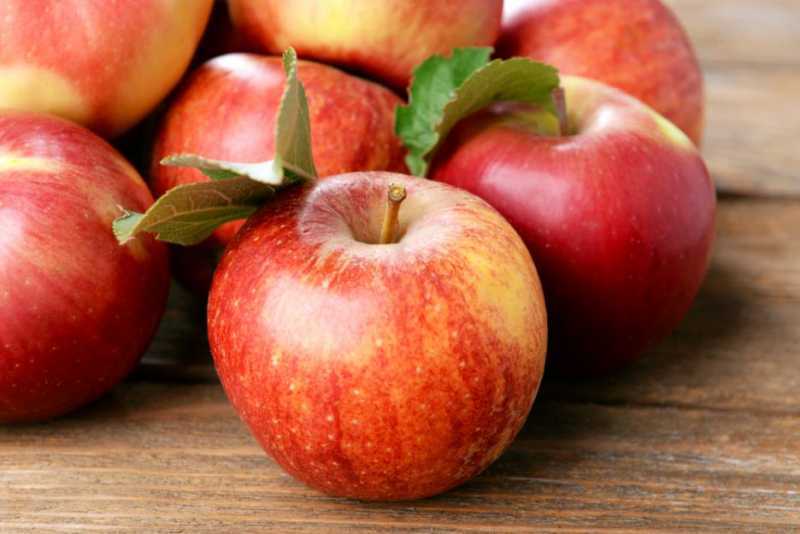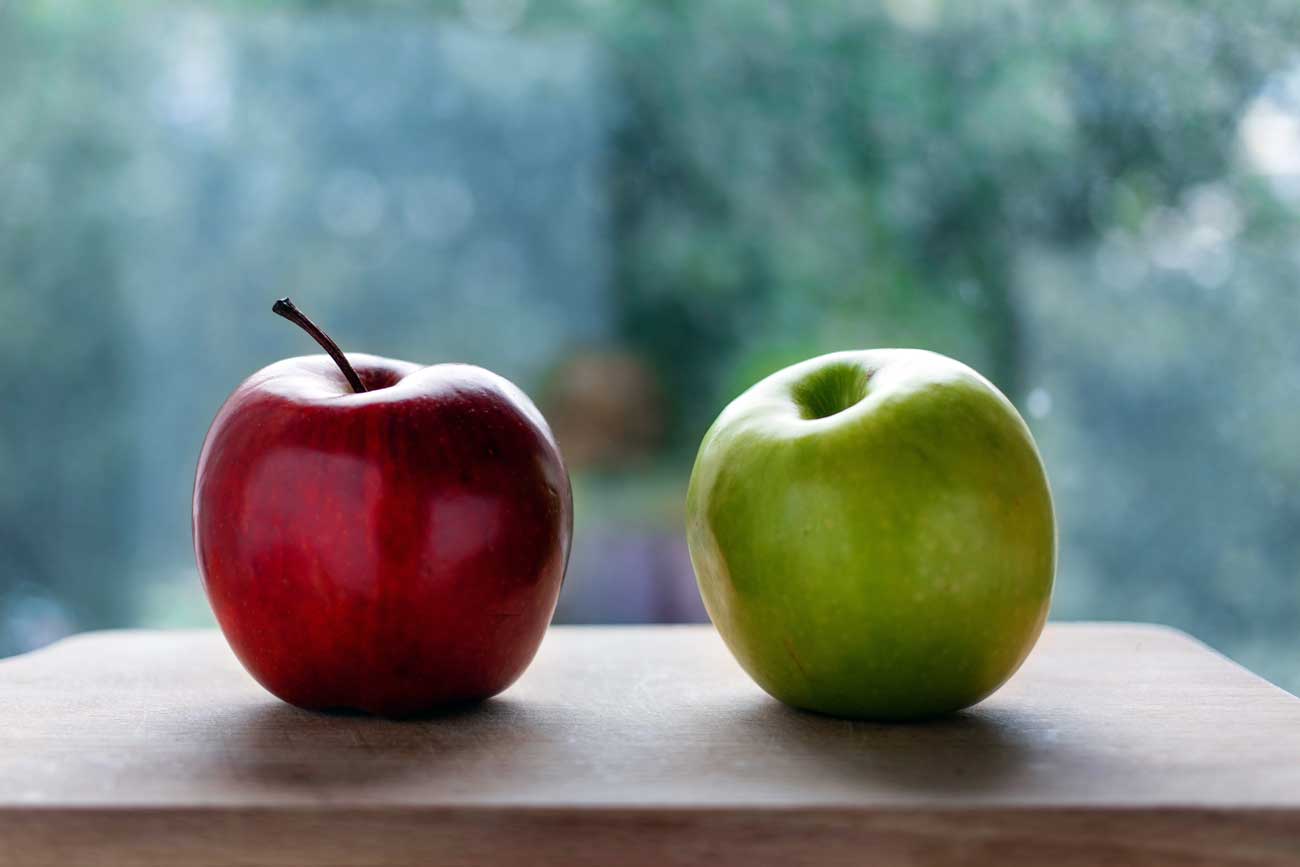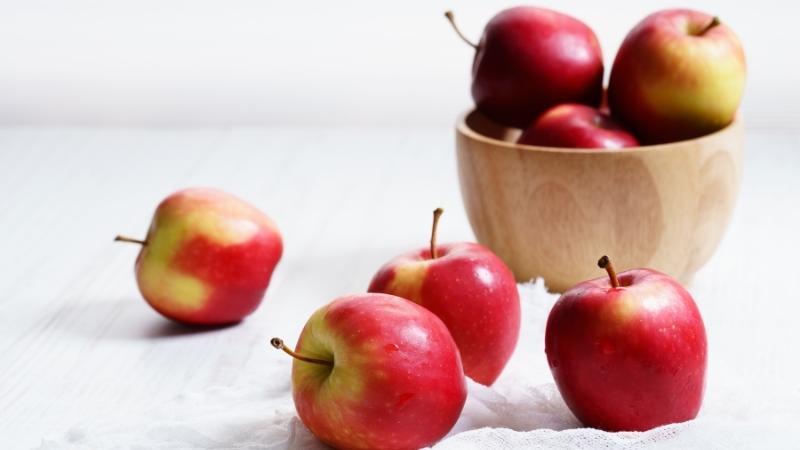Apples are packed with
1. How Many Calories Are in an Apple?
Apples are highly nutritious; a single apple provides the following nutrients:
- 95 Calories
- 25g Carbs
- 4.5g Fiber
- Vitamin C: 9% DV (Daily Value)
- Vitamin K: 5% DV
- Potassium: 4% DV
- Vitamin B6: 3% DV
 Apples are packed with nutrients
Apples are packed with nutrients
Additionally, apples contain beneficial compounds such as:
- Pectin: A type of soluble fiber that helps lower blood pressure and blood sugar levels. Like other fibers, pectin supports a healthy digestive system and contributes to bone and brain health.
- Quercetin: A flavonoid that reduces the risk of
cancer , especially lung and breast cancer. Quercetin also helps mitigate damage caused by free radicals, which are associated with aging and Alzheimer’s disease. - Vitamin C: Boosts immunity and plays a role in collagen synthesis, protecting against oxidative damage.
- Catechin, Chlorogenic Acid, and Beta-Carotene: These compounds fight free radical damage, lower the risk of diabetes, and improve cardiovascular and respiratory health.
2. What Are the Benefits of Eating Apples?
Supports Heart Health
Research suggests that eating more apples can reduce the risk of chronic illnesses, including heart disease. Apples contain flavonoids, which have anti-inflammatory properties and protect cardiovascular health. They’re also rich in
 Supports heart health
Supports heart health
Contains Compounds That Fight Cancer
 Apples contain compounds that fight cancer
Apples contain compounds that fight cancer
Apples are a source of several compounds that inhibit the growth of cancer cells, including powerful antioxidants like quercetin, vitamin C, and chlorogenic acid.
Other Health Benefits
 Apples are known to aid in weight loss
Apples are known to aid in weight loss
Apples are often recommended for weight loss due to their high fiber content, which promotes a feeling of fullness, and their low calorie count, which helps with calorie control.
Eating apples increases bone mineral density and reduces the risk of osteoporosis, asthma, memory loss, and age-related cognitive decline.
3. Is Eating a Lot of Apples Good for You?
According to Professor Julie Lovegrove, head of the Hugh Sinclair Human Nutrition Unit at the University of Reading, two large apples provide about a quarter of the daily fiber requirement.
Those who eat two apples daily tend to have lower levels of harmful LDL cholesterol compared to those who don’t regularly consume apples.
Apples can significantly reduce the risk of stroke or heart attack when cholesterol-related artery hardening is a contributing factor.
 Apples are suitable for all ages
Apples are suitable for all ages
However, not everyone agrees with this view. Some argue that eating two apples a day only reduces cholesterol by 4%, while prescription medications like statins can lower cholesterol by 30-55%.
This perspective is flawed because medications only provide temporary cholesterol reduction, whereas apples offer long-term benefits. Moreover, apples decrease the risk of cardiovascular disease.
Researchers also believe that a specific type of fiber in apples can feed beneficial gut bacteria, leading to the production of short-chain fatty acids, which, in turn, reduce the liver’s cholesterol synthesis.
Professor Julie Lovegrove further adds:
“We are confident that the fiber and polyphenols in apples are very beneficial. What’s more, apples are a versatile fruit suitable for all ages, easy to eat, and affordable. Anyone who eats apples will have healthier blood vessels, similar to the effects of other polyphenol-rich foods like
The American Journal of Clinical Nutrition suggests that women who eat two apples daily will experience a more significant reduction in harmful LDL cholesterol compared to men. This indicates that the female body may absorb and utilize the nutrients in apples more effectively.
4. Are There Any Side Effects of Eating Apples?
 Apples contain acids that can erode tooth enamel if consumed in excess
Apples contain acids that can erode tooth enamel if consumed in excess
While apples are delicious and packed with nutrients, overconsumption or improper consumption can have adverse effects on your health.
- Digestive Issues: The recommended daily fiber intake is 20 to 40 grams. Excessive apple consumption can lead to bloating and constipation.
- Blood Sugar Imbalance: Apples are rich in
natural sugars , and eating too many can cause a spike in blood sugar levels. For diabetics, consuming fruit sugars can exacerbate the condition. - Pesticide Exposure: Diphenylamine, a common pesticide used on apples, can be absorbed by the body if consumed in large quantities.
- Tooth Enamel Erosion: Apples contain acids that can erode tooth enamel if consumed in excess.
- Intestinal Stress: According to the Times of India, apples rank high among hard-to-digest foods. Therefore, they are not recommended for individuals prone to bloating or stomach issues.
You can easily find various apple varieties such as
5 Popular Apple Varieties
 Popular apple varieties
Popular apple varieties
With numerous apple brands available in the market, it can be challenging to choose the right one. Let’s take a look at some of the most popular apple varieties:
Red Delicious : Imported from the USA, these apples are typically harvested from mid-August to early September. They have a bright red color and a crisp, sweet taste.Gala : A popular choice, these apples have a deep red color and a subtle fragrance.Royal Gala : Originating from New Zealand, these apples have a honey-like flavor. They have a unique color, blending orange and red.Jazz : Another New Zealand variety, these apples are small but pack a punch in terms of flavor. They are a crossbreed of two other apple varieties.Pink Lady : An organic apple from France, known for its beautiful red color with golden speckles and its sweet, tangy taste.
6 How to Choose the Best Apples
 How to choose the best apples
How to choose the best apples
When selecting apples, look for those with bright, shiny skin that feels smooth to the touch. If you prefer sweeter apples, choose darker ones with small white spots on the peel. The perfect apple should be round, firm, and heavy for its size. When pressed, it should feel solid and slightly spongy.
Opt for apples that are slightly larger than a tennis ball. Avoid apples that are too small or too big. Freshly picked apples have stems that are firmly attached. Avoid apples that have fallen off the tree or have detached stems.
7 Frequently Asked Questions About Eating Apples
 Frequently asked questions about eating apples
Frequently asked questions about eating apples
Do Apples Make You Fat?
Despite their high nutritional content, apples contain only 70-80 calories and no fat, so you can enjoy them without worrying about weight gain.
When Is the Best Time to Eat Apples?
Mornings can be tiring due to low blood sugar levels. Eating an apple on an empty stomach allows the fruit’s sugar to quickly convert into glucose, which the body can easily absorb. Consuming apples when hungry prevents bile flow, stopping the accumulation of bile in the gallbladder and reducing the risk of gallstones.
The second-best time to eat apples is about an hour before bedtime. This not only improves oral health and kidney function but also promotes better sleep and prevents insomnia.
Who Should Not Eat Apples?
Individuals with conditions like
Given the numerous health benefits of apples, they are an excellent addition to your daily diet. However, remember to consume them in moderation, ideally up to two apples per day, to maximize their positive impact on your health.





































